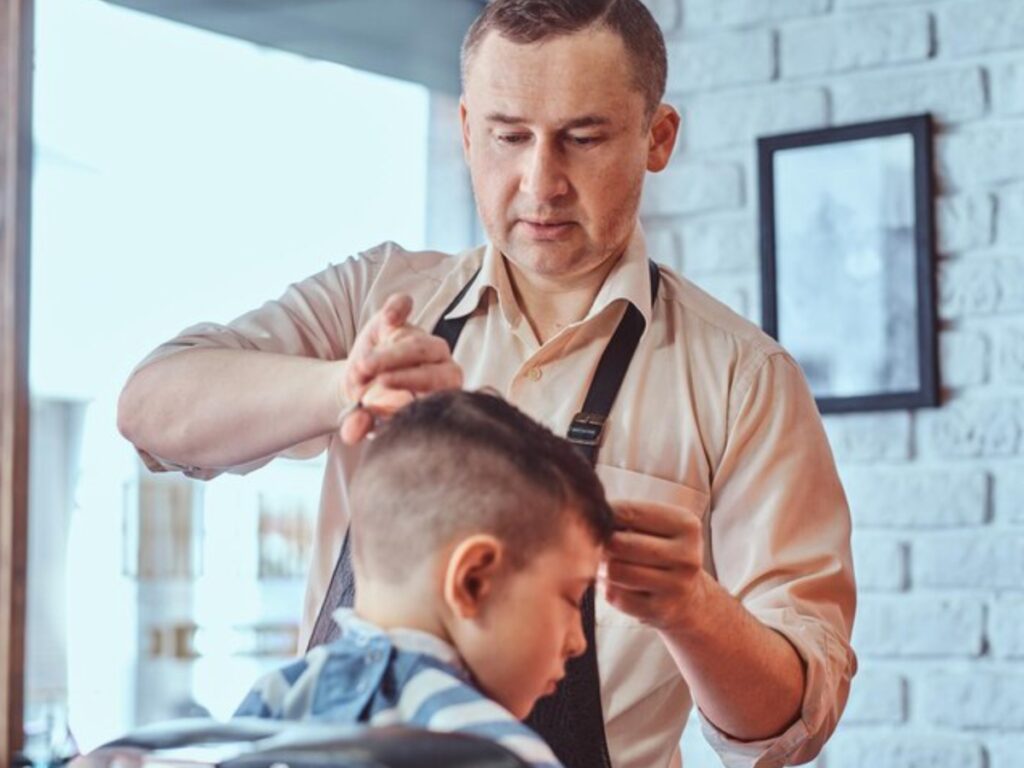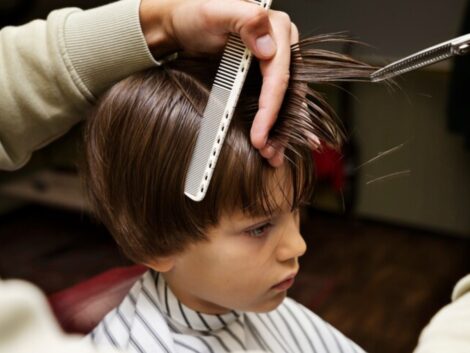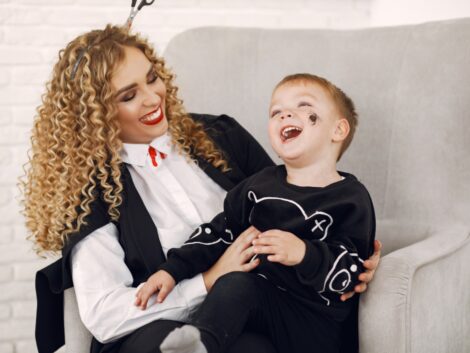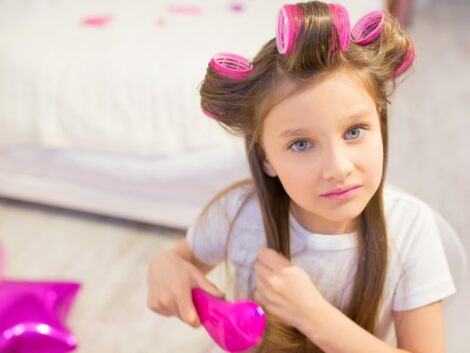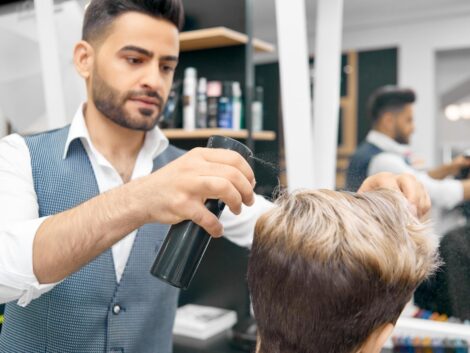Childhood haircut experiences can have a significant impact on self-perception. Positive experiences with getting haircuts can lead to feelings of confidence and self-esteem, as it may make a child feel well-groomed and attractive. On the other hand, negative experiences, such as a bad haircut or an unpleasant trip to the salon, can lead to feelings of embarrassment, self-consciousness, or even low self-worth. These negative experiences may also lead to a fear or aversion to getting haircuts in the future.
Additionally, hair is often a big part of a person’s identity and self-expression, so a negative haircut experience in childhood can affect how a person views themselves and their appearance. It may lead to a lack of confidence in their physical appearance and overall self-image.
Overall, childhood haircut experiences can impact self-perception by affecting a person’s confidence, self-esteem, and how they view themselves in terms of their appearance and identity.
https://youtu.be/UsZHtCTrz4g?si=0M6nKXR36SKq73Ut
How Can Positive Childhood Haircut Experiences Influence Self-Confidence?
A feeling of Control
Positive childhood haircut experiences help children feel in control of their appearance, as they may be able to make decisions about their haircut and style, contributing to a sense of empowerment and confidence.
Sense of Identity
A positive haircut experience can help children feel like they are expressing their true selves and individuality, contributing to a sense of identity and self-confidence.
Positive Reinforcement
Positive experiences with haircuts can give children praise and positive feedback from their parents, friends, and others, which can help boost their self-esteem and confidence.
Feeling Good about Appearance
A good haircut experience can help children feel good about their appearance, which can, in turn, boost their self-confidence and self-esteem.
Building Social Experience
Positive experiences with haircuts can also help children feel more comfortable and confident in social situations, as they may feel more confident in their appearance and how they present themselves to others.
What Are the Psychological Effects of Negative Haircut Experiences During Childhood?
Negative haircut experiences during childhood can have various psychological effects, including
Low Self-esteem
A bad haircut can cause feelings of embarrassment and insecurity, leading to a decrease in self-confidence and self-worth.
Negative Body Image
Children may develop negative perceptions of their physical appearance and body image as a result of a bad haircut, potentially leading to long-term body image issues.
Social Anxiety
Children may feel self-conscious and anxious about being judged or teased by their peers as a result of a bad haircut, leading to social withdrawal and avoidance of social situations.
Trust Issues
A negative haircut experience, especially if it occurred at the hands of a trusted individual such as a parent or stylist, can lead to difficulties in trusting others and relationships in the future.
Impact on Identity
A bad haircut can influence a child’s sense of self and identity, potentially leading to confusion or frustration about their appearance and how others perceive them.
It is important for parents and caregivers to provide support and reassurance to children who have had negative haircut experiences and to seek professional help if needed to address any lasting psychological effects.
How Do Parental Attitudes Toward Haircuts Shape a Child’s Perception of Grooming?
Parental attitudes toward haircuts can significantly influence a child’s perception of grooming. Suppose parents consistently prioritize and emphasize the importance of good grooming habits, such as regular haircuts, maintaining a neat appearance, and taking care of personal hygiene. In that case, the child is likely to internalize these values and adopt a positive attitude toward grooming.
On the other hand, if parents are nonchalant or dismissive about the need for regular haircuts and grooming, the child may not value these activities and may develop a more relaxed or indifferent attitude toward personal appearance.
Additionally, suppose parents express negative feelings, criticism, or attach shame to a child’s haircut or grooming habits. In that case, the child may develop a negative self-image and feel insecure about their appearance. This could significantly impact the child’s self-esteem and willingness to engage in grooming practices. Positive reinforcement and encouragement from parents regarding grooming habits can lead to a child feeling confident and comfortable with proper grooming practices.
Ultimately, parental attitudes and behaviors around haircuts and grooming play a pivotal role in shaping a child’s perception and habits related to personal hygiene and self-care.
Can Early Childhood Haircut Experiences Influence Personal Grooming Habits in Adulthood?
Yes, early childhood haircut experiences can certainly influence personal grooming habits in adulthood. Positive experiences during early years can set a foundation for a person’s comfort and confidence in grooming.
Conversely, negative experiences, such as traumatic haircuts or aversive encounters at a salon, may lead to anxiety or reluctance toward grooming practices. These early experiences can shape an individual’s attitudes and behaviors toward personal grooming as they grow older, potentially impacting the frequency and ease with which they engage in grooming routines.
Therefore, early childhood haircut experiences can have a lasting effect on personal grooming habits in adulthood.
What Role Does Societal Perception of Childhood Haircuts Play in Shaping a Child’s Self-Esteem?
The societal perception of childhood haircuts can have a significant impact on a child’s self-esteem. In many cultures, a child’s haircut is often seen as a reflection of their upbringing, family’s social status, and personal style.
If a child’s haircut is seen as stylish and well-maintained, they may receive positive attention and validation from their peers and adults, boosting confidence and self-esteem. On the other hand, if a child’s haircut is perceived as unkempt or out of style, they may be subjected to teasing or bullying, which can harm their self-esteem.
Furthermore, societal beauty standards and stereotypes around hair can also influence a child’s perception of themselves. For example, children with certain hair textures or styles may feel pressure to conform to mainstream beauty ideals, affecting their self-esteem and self-image.
Overall, societal perceptions of childhood haircuts can significantly shape a child’s self-esteem by influencing their sense of acceptance, belonging, and confidence in their appearance. It is important for parents and caregivers to support children in developing a positive self-image regardless of societal norms and to teach them to embrace their individuality and uniqueness.
Lastly, check out the mane caper shop.

